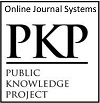THE DEVELOPMENT OF E-MODULES PROBLEM BASED LEARNING USING GOOLE CLASSROOM FOR BASIC ELECTRICITY AND ELECTRONICS AT VOCATIONAL SCHOOL
Abstract
The purpose of this research is to produce a valid e-modules problem based learning using Google Classroom practical, and effective in basic electricity and electronics subjects. This e-modules problem based learning using Google Classroom is designed to improve student’s understanding so that it can improve students learning outcomes. The method in this study uses Research and Development (R&D) with 4-D development procedures (Define, Design, Develop, Desseminate). The data of analysis technique uses descriptive analysis techniques to describe the validity, practicality, and effectiveness of e-modules problem based learning using Google Classroom. The results obtained of this development research: The validity of e-modules problem based learning using Google Classroom is declared valid on the media and material aspects. The practicality of e-modules problem based learning using Google Classroom from teacher and student responses is stated to be very practical. The effectiveness of e-modules problem based learning using Google Classroom is stated to be effective in improve to learn the outcomes. Based on the findings of this study it is concluded that the e-modules problem based learning using Google Classroom is valid, practical, and effective to be used as a learning aid in basic electricity and electronics subjects.
Keywords
Full Text:
PDFReferences
I. Yustanti and D. Novita, “Pemanfaatan E-Learning Bagi Para Pendidik Di Era Digital 4 . 0,” Pros. Semin. Nas., pp. 338–346, 2019, [Online]. Available: https://jurnal.univpgri-palembang.ac.id/index.php/Prosidingpps/article/download/2543/2357.
S. Sohibun and F. Y. Ade, “Pengembangan Media Pembelajaran Berbasis Virtual Class Berbantuan Google Drive,” Tadris J. Kegur. dan Ilmu Tarb., vol. 2, no. 2, p. 121, 2017, doi: 10.24042/tadris.v2i2.2177.
A. Gumrowi, “Meningkatkan Hasil Belajar Listrik Dinamik menggunakan Strategi Pembelajaran Team Assisted Individualization melalui Simulasi Crocodile Physics,” J. Ilm. Pendidik. Fis. Al-Biruni, vol. 5, no. 1, p. 105, 2016, doi: 10.24042/jpifalbiruni.v5i1.110.
E. Nurfalah, “Optimalisasi E-Learning berbasis Virtual Class dengan Google Classroom sebagai Media Pembelajaran Fisika,” Phys. Educ. Res. J., vol. 1, no. 1, p. 46, 2019, doi: 10.21580/perj.2019.1.1.3977.
E. D. S. Eliana, Senam, I. Wilujeng, and Jumadi, “The effectiveness of project-based e-learning to improve ICT literacy,” J. Pendidik. IPA Indones., vol. 5, no. 1, pp. 51–55, 2016, doi: 10.15294/jpii.v5i1.5789.
E. Zaduqisti, Pembelajaran Berbasis Masalah dalam Prediksi Dimensi Nilai Budaya. Pekalongan: CV. Duta Media Utama, 2015.
A. Hakim, Barir, “Efektivitas E-Learning Moodie, Google Classroom dan Edmodo,” J. I-Statemet, vol. 02, no. 1, p. 2, 2016.
I. Laili, G. Ganefri, and U. Usmeldi, “Efektivitas pengembangan e-modul project based learning pada mata pelajaran instalasi,” J. Imiah Pendidik. dan Pembelajaran, vol. 3, no. 3, pp. 306–315, 2019, doi: 10.23887/jipp.v3i3.21840.
Ngalimun, Strategi dan Model Pembelajaran. Yogyakarta: Aswaja Pressindo, 2013.
Rusman, Model-model Pembelajaran, Mengembangkan Profesionalisme Guru. Jakarta: Rajawali Press, 2010.
Richard I Arends, Learning to Teach, Belajar untuk Mengajar. Yogyakarta: Pustaka Belajar, 2007.
D. B. P. Pradana and R. Harimurti, “Pengaruh Penerapan Tools Google Classroom Pada Model Pembelajaran Project Based Learning Terhadap Hasil Belajar Siswa Diemas Bagas Panca Pradana Pendidikan Teknologi Informasi , Fakultas Teknik , Universitas Negeri Surabaya , Email : diemaspradana@mhs.une,” IT-Edu, vol. 02, no. 01, p. 62, 2017.
M. I. S. Sivasailam Thiagarajan, Dorothy S. Semmel, Instructional Development for Training Teachers of Exceptional Children: A Sourcebook. Center for Innovation in Teaching the Handicapped. Indiana: Indiana University Bloomington, 1974.
DOI: http://dx.doi.org/10.22373/cj.v4i2.7861
Refbacks
- There are currently no refbacks.
Copyright (c) 2020 Hengraini Eka Putri, Usmeldi Usmeldi Usmeldi
except where otherwise noted.






















